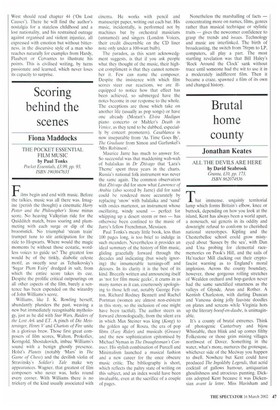Scoring behind the scenes
Fiona Maddocks
THE POCKET ESSENTIAL FILM MUSIC by Paul Tonks
Pocket Essentials, £3.99, pp. 93, ISBN 1903047633
Films begin and end with music. Before the talkies, music was all there was. Imagine (perish the thought) a cinematic Harry Potter and the Philosopher's Stone minus score. No heaving Valkyrian ride for the Quidditch match, brass soaring and plummeting with each surge or dip of the broomstick. No triumphal 'steam train' trumpet tune to stir anticipation for the ride to Hogwarts. Where would the magic moments be without those ecstatic, wordless voices to guide us? The greatest loss would be of the tinkly, diabolic celeste motif, as sweetly sour as Tchaikovsky's 'Sugar Plum Fairy' dredged in salt, from which the entire score takes its cue. Despite the prolific critical outpourings on all other aspects of the film, barely a sentence has been expended on the wizardry of John Williams's score.
Williams, like J. K. Rowling herself, abundantly plunders the past, weaving a new but immediately recognisable mythology, just as he did with Star Wars, Raiders of the Lost Ark and ET. A pinch of Die Meistersinger, Henry V and Chariots of Fire unite in a glorious brew. Those first great composers of film scores, Walton, Prokofiev, Korngold, Shostakovich, imbue Williams's sound with a benign ghostly presence. Hoist's Planets (notably 'Mars' in The Game of Chess) and the devilish violin of Stravinsky's Soldier's Tale make wry appearances. Wagner, that greatest of film composers who never was, lurks round every corner. With Williams there is no trickery of the kind usually associated with cinema. He works with pencil and manuscript paper, writing out each bar. His music, incidentally, is performed not by machines but by orchestral musicians (unnamed) and singers (London Voices, their credit discernible on the CD liner note only under a 100-watt bulb).
The paradox, as this scant acknowedgment suggests, is that if you ask people what they thought of the music, their highest compliment is that they cannot remember it. Few can name the composer. Despite the insistence with which film scores steer our reactions, we are illequipped to notice how that effect has been achieved, so submerged have the notes become in our response to the whole. The exceptions are those which take on another life (usually as pop songs) or have one already (Mozart's Elvira Madigan piano concerto or Mahler's Death in Venice, as they tend to be dubbed, especially by concert promoters). Casablanca is now inseparable from 'As Time Goes By', The Graduate from Simon and Garfunkel's 'Mrs Robinson'.
Maurice Jarre has much to answer for. So successful was that maddening wah-wah of balalaikas in Dr Zhivago that 'Lara's Theme' spent three years in the charts. Russia's national folk instrument was never the same again. The common observation that Zhivago did for snow what Lawrence of Arabia (also scored by Jarre) did for sand could be rendered more accurately by replacing 'snow' with balalaika and 'sand' with ondes martcnot, an instrument whose oscillating, windy sound — perfect for whipping up a desert storm or two — has otherwise been confined to the music of Jarre's fellow Frenchman, Messiaen.
Paul Tonks's meaty little book, less than 100 pages long, is too brief to indulge in such meanders. Nevertheless it provides an ideal summary of the history of film music, gliding gracefully forward through the decades and indicating (but wisely ignoring) the innumerable turnings-off and detours. In its clarity it is the best of its kind. Breezily written and announcing itself as `not for film music geeks', it crams in as many names as it can, courteously apologising to those left out, notably George Fenton, Richard Rodney Bennett and Rachel Portman (women are almost non-existent in this story. so the inclusion of one might have been tactful). The author steers us forward chronologically, from the silent era in which Max Steiner was king (Kong) to the golden age of Rosza, the era of pop films (Easy Rider) and musicals (Grease) and the new sophistication epitomised by Michael Nyman in The Draughtsman's Contract. His stylish combination of Purcell and Minimalism launched a musical fashion and a new career for the once obscure music critic. The bibliography is short, which reflects the paltry state of writing on this subject, and an index would have been invaluable, even at the sacrifice of a couple of pages. Nonetheless the marshalling of facts — concentrating more on names, films, genres rather than musical technique or stylistic traits — gives the newcomer confidence to grasp the trends and issues. Technology and music are interlinked. The birth of broadcasting, the switch from 78rpm to LP, computers, all play a part. The most startling revelation was that Bill Haley's 'Rock Around the Clock' sank without trace until someone had the wit to use it in a moderately indifferent film. Then it became a craze, spawned a film of its own and changed history.
















































































 Previous page
Previous page